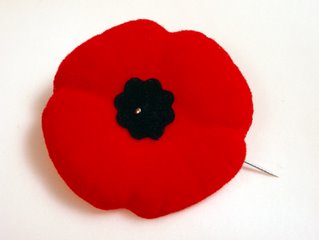
Through a combination of luck and design, I'm the first male child in 500 years of my family's history who did not go to war. It's not that I come from some military lineage. On the contrary, most of my warrior ancestors were ordinary men who simply answered the call and thereafter seldom spoke of what they had experienced in their wars. It was only after my Grandfather's death that I learned he had been decorated at Vimy Ridge and gone "over the top" into hand to hand combat 13 times. My father never spoke about his service in WWII until he came back from visiting Normandy on the 60th anniverary of D-Day.
All the same, November 11th was reverently observed during my childhood. The vets all marched wearing their medals. The service at the cenotaph was crowded and solemn. You saw grown men fighting tears as the trumpeter played "The Last Post". Later, while my mother and my aunts reset the recently used Thanksgiving table, my dad and my uncles would pass around a quart of rye and talk about the guys who didn't come back. The one on the oil tanker that was torpedoed. The brothers who died on the same beach. The kid whose Spitfire disappeared without a trace. They spoke of which of the departed had been a great pitcher in high school, which one had a child born after his passing, how somebody's parents had kept the farm going without him; never the details of their deaths, never how the loss of boyhood friends, cousins or brothers had impacted their own lives.
TV in the 50's and 60's usually featured war movies on Remembrance Day. Some might have been historically based. Most often they were the jingoistic American fare starring John Wayne or Audie Murphy that all the vets hated. They'd wink at each other as Wayne charged across the sands of Iwo Jima blasting away. "Yeah, that's pretty much what it was like...."
Nobody ever asked why there weren't any Canadian war movies. Back then there weren't Canadian movies period. And by the time we had an industry that could have made them, we'd witnessed Vietnam and graduated our military to peacekeeping. The stories we'd never heard weren't what people wanted to see anymore.
From time to time, I run across writers or producers wanting to tell the story of Vimy Ridge or Dieppe or Ortona. But I can't envision any of those films ever being made. War stories are out of fashion now. They don't reflect the image we'd like to portray to the world.
And that's a shame, because it denies who we were and still are on many levels. And it eliminates the opportunity of dramatizing Canadian experiences in ways that might make everyone look at John Wayne the way those vets in my family did.
This is the one combat story my father has told me.
He was awakened the morning of June 6, 1944 by the silence. For days he and his RCAF squadron had been socked in by the weather. But the steady rain that had hammered the tin roof of their barracks had stopped. The weather was clearing and the D-Day invasion canceled twice in the last week was on. While their planes were fueled and loaded with ammunition, he sat on the tailgate of a truck with some of the "other fellas" having tea and biscuits, both frightened and excited that this day had finally arrived.
Their job was to attack armored columns and troop trains that would be rushing German reinforcements to the stormed beaches. For the rest of the day, he flew mission after mission following those orders. By late afternoon, he knew the ground forces were pushing inland and was flying deeper into France in search of targets. At twilight the squadron spotted a large column of infantry that had stopped to eat their evening meal.
What my father remembers of that attack was not the CGI carnage of a Speilberg movie but men sitting on the tailgate of a truck, looking up from their meal as his guns tore them apart.
For my father this has always exemplified the enduring lessons of war. The first -- No matter what terrible things were done, if they were not done the men on that truck would have done the same to his friends. And second -- no matter how much they were demonized, the men you were killing were no different from you. As he put it, "We could never be proud of what we'd done, just thankful we had survived the doing."
Somehow it feels like those are truths worth remembering and helping others to remember.










